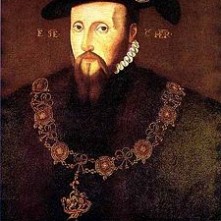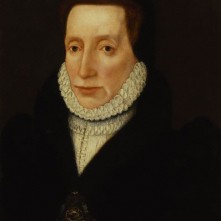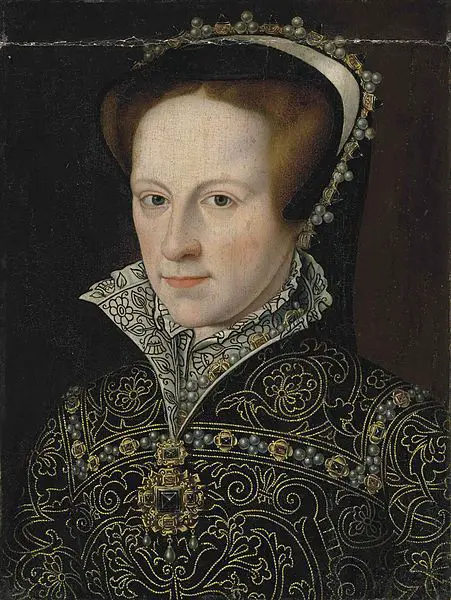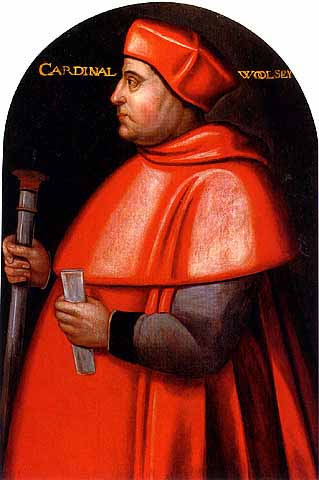3 October
1518 - Cardinal Wolsey sang a mass to Henry VIII and the French ambassadors at St Paul's Cathedral in celebration of the treaty agreed between the two countries the previous day. The King and ambassadors also took oaths to the treaty.
1559 – Death of Sir William Fitzwilliam, Gentleman of Edward VI's Privy Chamber. He was buried in St George's Chapel, Windsor Castle.
1584 – Death of Sir Gilbert Dethick, herald, Garter Principal King of Arms and diplomat, in London. He was laid to rest in the church of St Benet Paul's Wharf. Dethick's offices included Hampnes Pursuivant of Arms Extraordinary (1536), Rouge Croix Pursuivant of Arms in Ordinary (1540), Richmond Herald of Arms in Ordinary (1540), Norroy King of Arms (1547) and Garter Principal King of Arms (1550).
4 October
1507 – Birth of Sir Francis Bigod, leader of Bigod's Rebellion, at Seaton, Hinderwell, Yorkshire. Bigod led an uprising in Beverley, Yorkshire, in January 1537, following the Pilgrimage of Grace, and was executed in June 1537.
1531 – Baptism of Henry Stanley, 4th Earl of Derby, at Lathom House, Lancashire. He was the eldest son of Edward Stanley, 3rd Earl of Derby, and his wife, Dorothy (née Howard). Derby served Elizabeth I as an Ambassador, Privy Councillor and Lord High Steward at the trial of Philip Howard, Earl of Arundel and Surrey.
1536 - There was trouble in Horncastle, Lincolnshire. This was part of what we know as the Lincolnshire Rising which, in turn, was part of the Pilgrimage of Grace rebellion. Dr Raynes, the chancellor of the Bishop of Lincoln, was killed by the rebels, as was Thomas Wulcey (or Wolsey), one of Cromwell’s men.
1539 – Signing of the marriage treaty between Henry VIII and Anne of Cleves.
1556 – John Cheke made a public recantation of his Protestant faith in front of Queen Mary I.
1581 – Death of Henry Wriothesley, 2nd Earl of Southampton, at Itchel in Hampshire. He was buried at Titchfield.
5 October
1518 – Formal betrothal of Princess Mary, daughter of Henry VIII and Catherine of Aragon, and the Dauphin of France.
1528 – Death of Richard Foxe, Bishop of Winchester, founder of Corpus Christi College, Oxford, and Lord Privy Seal in the reign of Henry VII and at the beginning of Henry VIII's.
1549 – Edward Seymour, Protector Somerset, ordered a gathering of men at Hampton Court Palace, where he was lodged with the young Edward VI due to tensions mounting between Somerset and John Dudley, Earl of Warwick.
1553 – Parliament met in Mary I’s reign – It repealed the “treason act” of Edward VI’s reign, passed an act declaring the legitimacy of Mary I, and reinstated the Mass in Latin, celibacy of the clergy and ritual worship. It was as if the reformation of Edward’s reign had never happened.
1555 – Death of Edward Wotton, physician and naturalist. He was buried in St Alban Church, Cheapside, London. Wotton is known for starting the study of zoology and his works included De differentiis animalium libri decem which he dedicated to Edward VI.
1598 – Burial of Thomas Crooke, Church of England clergyman, at St Mary Woolchurch in the chancel.
1605 – Death of Sir Edward Lewkenor, politician and Puritan patron, at Denham Hall from smallpox. He was laid to rest at Denham church.
6 October
1510 – Birth of John Caius, theological scholar, Royal Physician and founder of Gonville and Caius College, Cambridge, at Norwich. He was the son of Robert Caius and his wife, Alice (née Wode). Caius studied medicine at Padua and was physician to Edward VI, Mary I and Elizabeth I.
1536 - The traditional date given for the execution of reformer, scholar and Bible translator, William Tyndale. Tyndale, whose works include “The Obedience of a Christian Man” (a book Anne Boleyn shared with Henry VIII), had incurred the wrath of Henry VIII after the publication of his “The Practyse of Prelates”, in which he opposed Henry VIII’s planned annulment from Catherine of Aragon.
1557 – Death of John Capon (also known as John Salcot), former Benedictine monk and Bishop of Salisbury, probably from influenza. He was buried in the choir at Salisbury Cathedral. He appeared to have reformist leanings in the reigns of Henry VIII and Edward VI, but became a conservative Catholic again in Mary I's reign, and was involved in the examination of those deemed to be heretics.
7 October
1506 – Death of Sir Thomas Frowyk, Judge and Chief Justice of the Common Pleas. He was buried with his first wife, Joan, at Finchley Parish Church in Middlesex, on the north side of the chancel.
1533 – Death of Sir John Scott, soldier. Scott served as a Senior Captain in the army sent to the Low Countries in 1511 to support Margaret of Austria, and was rewarded for his service by a knighthood. He also served in France in 1514 and 1523.
1577 – Death of George Gascoigne, author, poet, courtier and soldier, in Stamford, Lincolnshire. He was buried there, at St Mary's parish church. He is listed as one of the most important Tudor poets, along with the likes of Sir Thomas Wyatt, Henry Howard, Earl of Surrey, and Philip Sidney. His works included “A Discourse of the Adventures of Master FJ”, “The Supposes”, “A Hundredth Sundry Flowres...” and “The Posies of George Gascoigne, Esquire”.
1589 – Death of William Hawkins, merchant and sea captain, at Deptford. He was buried at St Nicholas's Church. In 1580, Hawkins led an expedition to the Caribbean, returning to England with treasure and sugar. In 1588, he was involved in leading seven ships from Plymouth against the Spanish Armada.
8 October
1515 - Birth of Lady Margaret Douglas, Countess of Lennox. Margaret was the daughter of Margaret Tudor, Queen Dowager of Scotland and sister of Henry VIII, and Archibald Douglas, 6th Earl of Angus.
1536 – The commons, i.e. the people, approved the petition of grievances drawn up by the rebels of Horncastle, Lincolnshire.
1549 – Edward Seymour, Duke of Somerset and Lord Protector, was proclaimed a traitor by the King's Privy Council.
1561 – Baptism of Edward Wright, mathematician and cartographer, at Garveston in Norfolk. Wright is known for his treatise “Certaine Errors in Navigation” (1599), his work on Mercator's map projection and his translation of John Napier's 1614 Mirifici logarithmorum canonis descriptio into English.
1594 – Death of Ellis Price (Prys), scholar and administrator. Price served Henry VIII as a Monastic Visitor in Wales 1535, Commissary-General and Chancellor of the diocese of St Asaph, and as an administrator in Wales after the “Acts of Union”. He also later served as Sheriff of Merioneth, Anglesey, Caernarfon, and Denbigh, and a member of the council in the Marches of Wales.
9 October
1514 - The eighteen year-old Mary Tudor, sister of Henry VIII, married the fifty-two year-old King Louis XII of France at Abbeville.
1529 – A writ of praemunire was filed against Cardinal Thomas Wolsey in the court of King’s Bench.
1536 – Pilgrimage of Grace: The rebels of Horncastle, Lincoln, dispatched their petition of grievances to the King and also north into Yorkshire.
1547 – Baptism of Miguel de Cervantes, author of Don Quixote, in Alcalá de Henares, Spain. His actual birthdate is unknown.
1573 – Death of Sir Thomas Wroth, courtier, politician and landowner. Wroth served Edward VI as a Gentleman of the Privy Chamber and was with him when he died.
1604 – Death of Sir William Peryam, Judge, at Little Fulford, near Credington in Devon. He was laid to rest at Holy Cross Church. Peryam was on the commissions at the trials of Mary, Queen of Scots, the Earl of Arundel, the Earl of Essex and Sir John Perrot, and served as Chief Baron of the Exchequer from 1593 until his death.









Leave a Reply